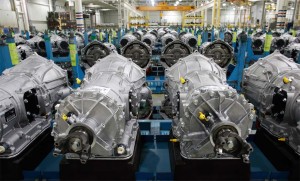With federal help, General Motors Corp. is sinking an additional $23.5 million into production of components for electric vehicles at a factory near Baltimore, Maryland, where it will produce motors for future battery cars.
The new investment follows GM’s earlier commitment of $246 million to the Baltimore plant back in January. The investments create new jobs at the plant, according to GM officials, which has been under pressure to create more jobs at the company’s U.S. operations in return for the federal bailout that kept it alive.
Meanwhile, GM’s former parts arm, Delphi Corp. is pushing into the nascent EV market with a new partnership aimed at developing wireless charging technology.
“This will allow us to strengthen our core electrification components expertise,” said GM Manufacturing Manager Arvin Jones, about the maker’s latest Baltimore investment. “We’ll have more to say about specific products later.”
The investments in the plant near Baltimore will be made with assistance from the Recovery Act funding announced in August 2009 by the U.S. Department of Energy.
GM’s first battery car-related investment, announced back in January, will help it build a high-volume electric drive production facility for GM’s next-generation rear-wheel drive two-mode Hybrid system.
The addition of electric motor production, which is scheduled to start in 2013, will take place in a separate facility to be built on the same site as the current Baltimore plant. GM has decreed that in engineering and building electric motors, which it once outsourced to independent suppliers, the technology will be considered a “core” competency by GM top management.
Meanwhile, former GM component subsidiary Delphi Corp. announced it is preparing to get into the EV charging business.
Delphi said it has reached an agreement with WiTricity Corp., a wireless energy transfer technology provider, to develop automatic wireless charging products for hybrid and electric vehicles.
Randy Sumner, Delphi director of global hybrid vehicle development, said the collaboration with WiTricity will help establish a global infrastructure of safe and convenient charging options for consumer and commercial electric vehicles.
“This is groundbreaking technology that could enable automotive manufacturers to integrate wireless charging directly into the design of their hybrid and electric vehicles,” said Randy Sumner, director, global hybrid vehicle development, for the Delphi Packard Electrical/Electronic Architecture.
Drivers would simply park their electric vehicle over a wireless energy source that sits on the garage floor, or is embedded in a paved parking spot. The system will automatically transfer power to the battery charger on the vehicle, he said.
Eric Giler, WiTricity chief executive officer, said wireless systems can already transfer over 3,300 watts — enough to fully charge an electric car at the same rate as most residential plug-in chargers.
“Charging an electric car should be as easy as parking it in your garage or parking spot,” Giler said.

